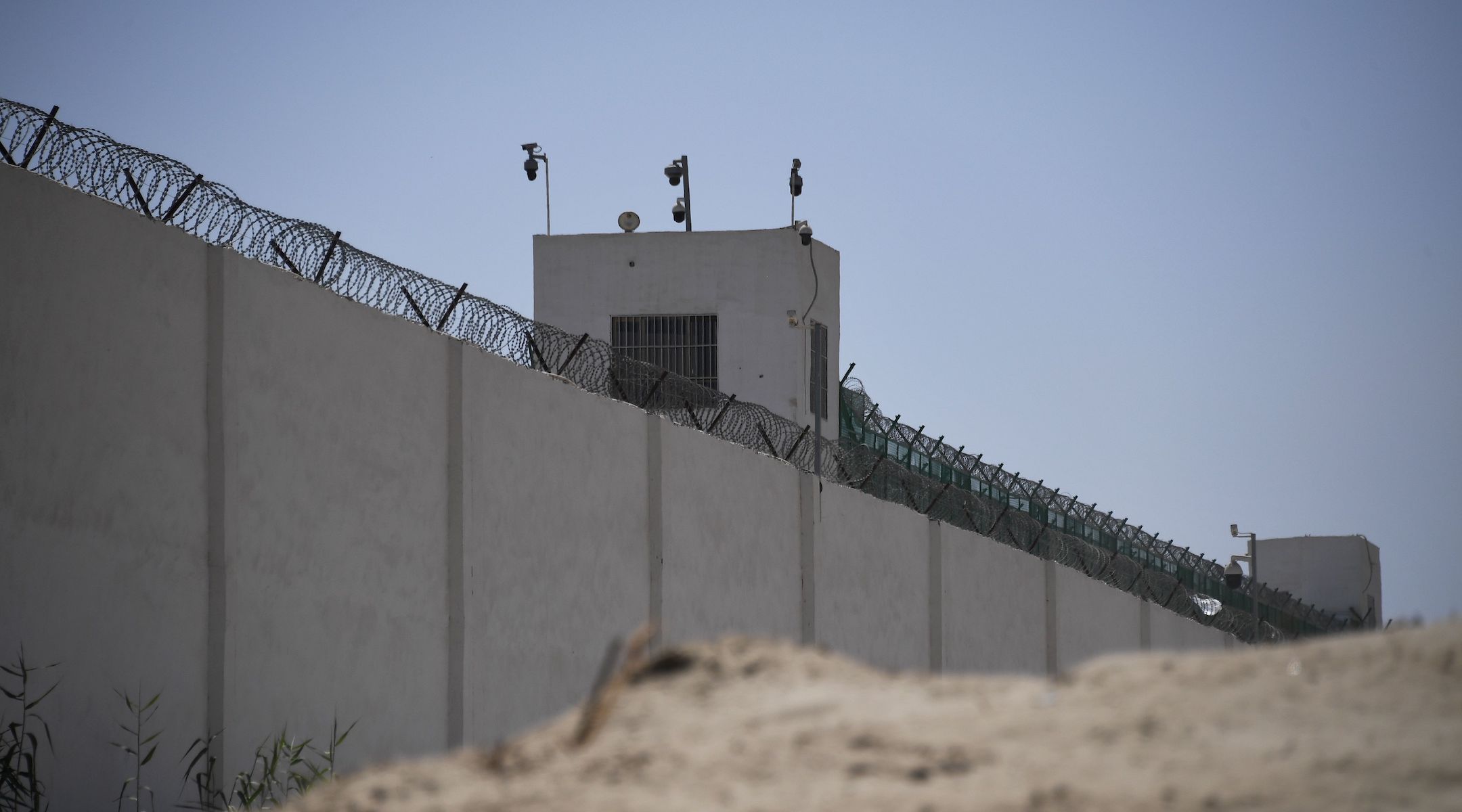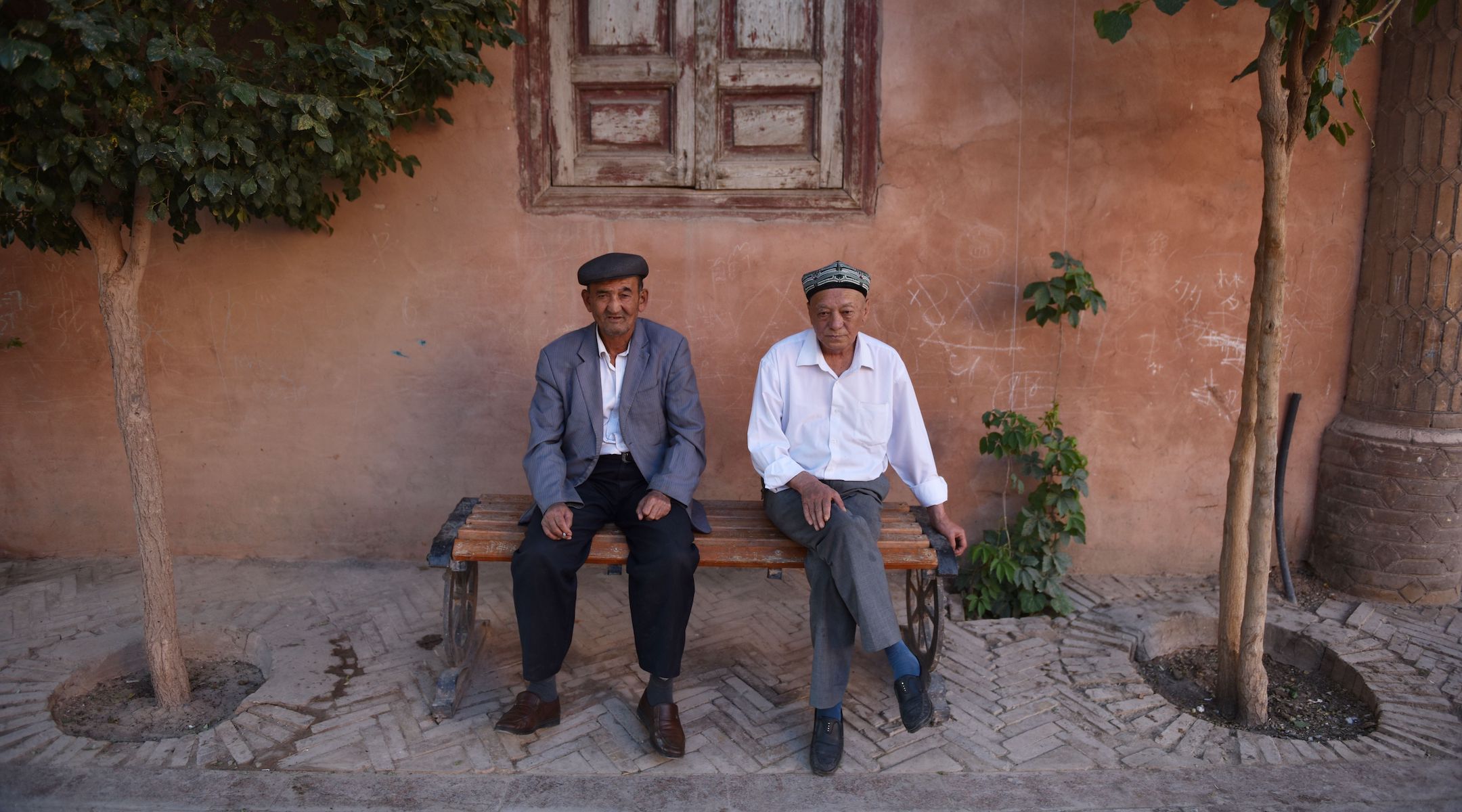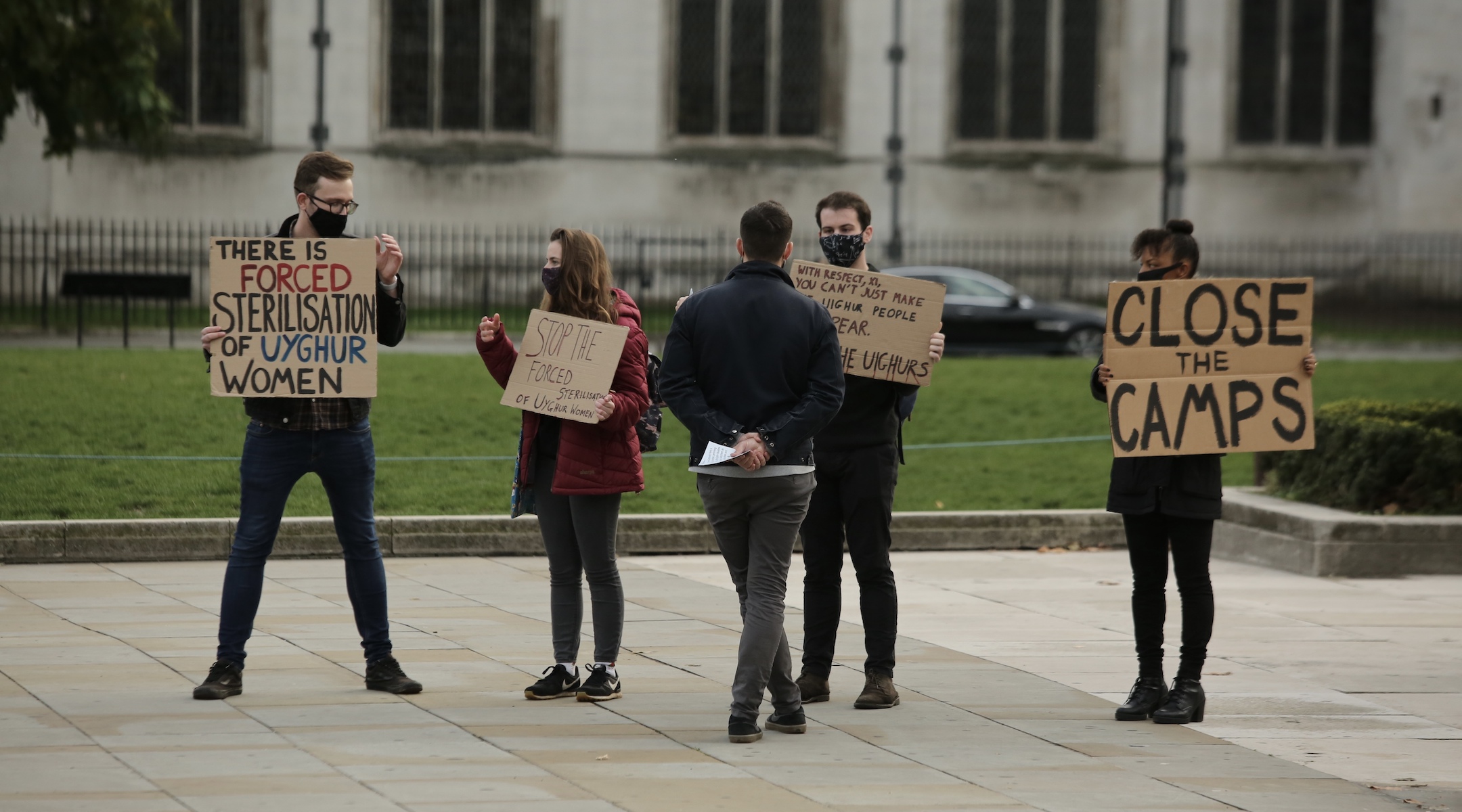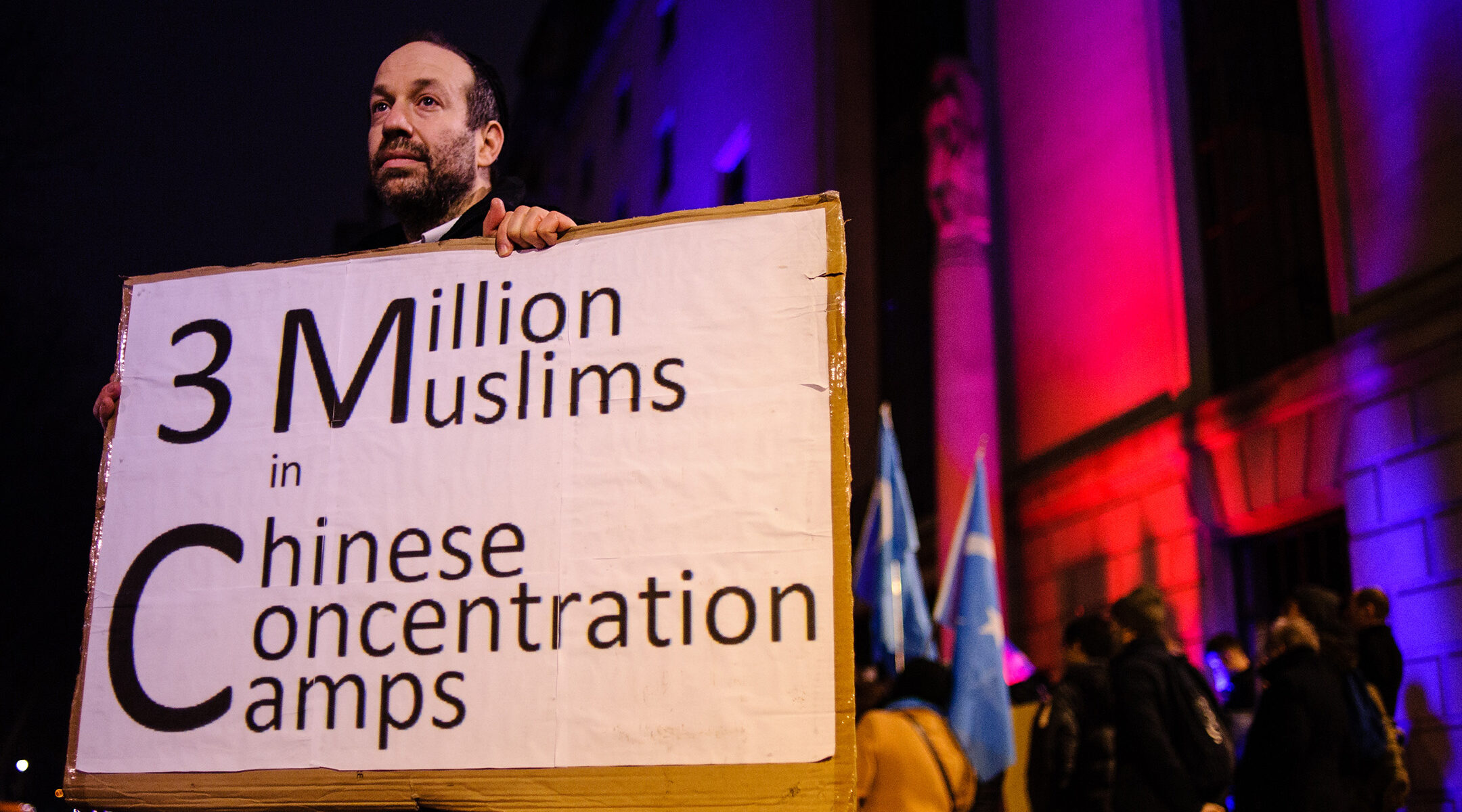(JTA) — As the leader of British Jewry’s main human rights group, Mia Hasenson-Gross regularly hears personal stories of loss, grief and helplessness.
But few encounters have affected Hasenson-Gross as profoundly as the one she had in 2019 with Rahima Mahmut, a U.K.-based activist for the rights of Uighurs, a Muslim minority that is the target of what the U.S. State Department and many advocates say is an attempted genocide by the Chinese government.
Mahmut shared that she has not spoken in over four years with the family she left behind in 1997 following an earlier government crackdown on Uighurs called the Ghulja massacre in which dozens were killed. Mahmut does not know whether her siblings are dead or alive, she told Hasenson-Gross.
“I found myself thinking back about my own grandfather, Saul Gun, who left his family in Romania in the 1920s and soon thereafter never really knew what exactly happened to them during the Holocaust,” Hasenson-Gross told the Jewish Telegraphic Agency.
The director of the London-based Rene Cassin charity, she decided she had to spread the word about what was happening to the Uighurs.
Hasenson-Gross’s efforts added to an unusual mobilization that has turned British Jews — including their chief rabbi, who usually remains aloof from political issues that don’t directly involve Jews or Israel — into some of the most vocal advocates for the Chinese Muslim minority.
“Reflecting upon the deep pain of Jewish persecution throughout the ages, I feel compelled to speak out,” Chief Rabbi Ephraim Mirvis wrote in a Dec. 15 op-ed in The Guardian titled “As chief rabbi, I can no longer remain silent about the plight of the Uighurs.”
For British Jewry, the effort is akin to the fight by American Jews 15 years ago against the genocide in Darfur: a situation so resonant of the Jews’ historical trauma that entire communities are joining in. Unusually, the push to draw attention to the Uighur cause is captivating not just liberal Jews often involved in issues of social justice but Orthodox Jews, as well.
“People in the rank and file of the community are talking about this issue,” said Herschel Gluck, a prominent Orthodox rabbi who has fostered relationships with British Muslims. “This is something that is felt very deeply by the community. They feel that if ‘Never again’ is a term that needs to be used, this is certainly one of the situations where it applies.”
One of the first British Jews to openly join with the Uighurs is an Orthodox Jew named Andrew, who since 2019 has been protesting, mostly on his own, outside the Chinese Embassy in London. At least twice a week, in all kinds of weather conditions, he takes up his position holding a sign reading “3 million Muslims in Chinese concentration camps.”
“As a Jew, knowing what happened to the Jews 80 years ago, the world did nothing for us. I don’t understand how I can sit still and do nothing,” Andrew told The Jewish News of London in 2019. (He declined JTA’s request to feature him last year, saying he preferred not to distract attention from his cause with reporting about his identity.)

This photo taken on May 31, 2019 shows the outer wall of a complex that includes what is believed to be an internment camp full of ethnic Muslims, on the outskirts of Hotan, in China’s northwestern Xinjiang region. (Greg Baker/AFP via Getty Images)
Eliyahu Goldsobel, a 33-year-old Orthodox rabbi from London who works with the Rene Cassin human rights group, has organized several “Jews for Uighurs” rallies outside Volkswagen showrooms in London. The German firm, which was complicit in the Holocaust, has facilities in China’s heavily Uighur region of Xinjiang.
Rene Cassin has also engaged young British Jews in connection with the issue by organizing a videoconference on the subject for the Union of Jewish Students.
The Jewish mobilization has risen to the highest level of the organized Jewish community. Earlier this month, the Board of Deputies of British Jews held a news conference to urge Parliament to amend trade laws and make it harder for the government to deal with countries that perpetuate genocides. (The effort was unsuccessful.)
In China, hundreds of thousands of Uighurs have been put in so-called re-education camps, a Chinese government euphemism for what are widely seen as concentration camps. Testimonies of police and army brutality are widespread, and recent accounts of rape and forced sterilization have also emerged.
Mahmut’s brother in their last conversation asked her to stop calling home as it endangers the very lives of her relatives, she said at the Board of Deputies news conference.
“It’s been four years I lost contact with my own family, and in my last conversation with my brother, he said to me, ‘Please leave us in God’s hands. We leave you in God’s hands, too.’ And that is the only way that I cope, is God help us, God help them, please protect them,” she said. “And today I need your help.”
Mirvis in his Guardian op-ed did not use the term genocide, but did call it “a mass atrocity” whose weight is “overwhelming.” Satellite images, leaked documents and survivor testimonies “all paint a devastating picture affecting well over 1 million people, which, for the most part, the world continues to ignore,” he wrote.
The rabbi’s op-ed opened with Mahmut’s story — Mirvis had met with her upon Rene Cassin’s request. It drew several comparisons with Jewish history, including the oppression of Soviet Jews.
Mirvis, who was born in apartheid South Africa, made reference to his native land.
“For so long, any notion of positive change was rendered impossible by the impregnable power and ruthless determination of the apartheid authorities,” he wrote. “And, yet, change did eventually come.”

Uighur men rest in the restored old city area of Kashgar, in China’s western Xinjiang region, in 2019. (Greg Baker/AFP via Getty Images)
Unlike Mirvis, the archbishop of Canterbury, the leader of the Church of England, has not addressed the Uighur issue. Neither has Pope Francis in the Vatican, despite repeated calls to do so on both Christian faith leaders.
In the United States, while Jewish groups have expressed grave concern about China’s treatment of its Uighur minority, there hasn’t been the kind of all-hands-on-deck effort that led college students to spend their summers and teenagers to spend their bar mitzvah money lobbying for refugees in Darfur.
Perhaps the most unusual aspect of Mirvis’ intervention is that he recommended to the British government concrete steps for how to address the Uighur crisis. He did not offer such advice even in 2019, when he waded into politics for the first time to comment on the proliferation of anti-Semitic rhetoric within the Labour Party.
“It is clear that there must be an urgent, independent and unfettered investigation into what is happening. Those responsible must be held to account and Uighurs able to escape must be given asylum,” Mirvis wrote.
His op-ed neither mentioned the Holocaust nor drew parallels between the World War II genocide and the oppression of the Uighurs. But Marie van der Zyl, the Board of Deputies president, made those connections explicitly at the news conference.
“As the Jewish community, we are hesitant to consider comparisons to the murder of 6 million Jews and many others by the Nazis,” she said. But, she added, “nobody could fail to notice the similarities between what is alleged to be happening in the People’s Republic of China today and what happened in Nazi Germany 75 years ago.”
Among the similarities, van der Zyl noted the forced transport by train, forced trimming of beards, “women being sterilized and the grim spectrum of concentration camps.”
Ian Blackford, a lawmaker who attended the Jewish group’s news conference, said the amendment on limiting trade would follow the example set by the British government in the 1930s, when it admitted 10,000 Jewish children from Nazi-occupied countries. Van der Zyl’s father was among those young refugees on what were known as Kindertransports.
“The Kindertransport was a fantastic thing,” Blackford said. “We need to show that same generosity and support to those who are suffering persecution today.”
He also acknowledged the strong mobilization within British Jewry to act on the Uighurs’ oppression.
“I’d like to thank the Board of Deputies for its show of leadership in this issue, it has been inspirational,” Blackford said.
That leadership has included more than a dozen media statements and Jewish community events designed to raise awareness about the plight of the Uighurs.
Just how deeply the concern is registering with ordinary Jews has been hard to gauge because of the pandemic lockdown that makes gatherings impossible and has sent events online, said Rabbi Alexander Goldberg, a human rights activist and dean of the college of chaplains at the University of Surrey, south of London.
But, he said, “This has trickled down to some extent to the rank and file.”

Protesters in London hold placards in support of the Uighur people, Oct. 8, 2020. (Hasan Esen/Anadolu Agency via Getty Images)
The British reaction to the atrocities in Darfur in the early 2000s was far less vocal, involving none of the high-profile actions and coming far later than that of Jews in the United States.
The situation in Darfur was less evocative of the Holocaust for many British Jews, according to Gluck. There were mass killings in Darfur, but with Uighurs, “the parallels to the Holocaust and to the events leading up to the Holocaust are much clearer because of the religious element,” the rabbi said.
Edwin Shuker, vice president of the Board of Deputies, sees another reason that some leaders of British Jewry have mobilized for Uighurs: the perceived increase in anti-Semitism in the United Kingdom in recent years.
Starting in 2015, the British Labour Party, which for decades was the political home for many Jews, was rocked by a series of scandals involving anti-Semitism that British Jewish leaders blamed largely on Jeremy Corbyn, the far-left politician who had been elected to lead the party that year. Corbyn has been replaced by Keir Starmer, a centrist who has promised to reform the party’s handling of the issue.
“It’s a matter of principle,” Shuker said, “but it’s also arriving at the decision that to fight anti-Semitism is to fight for each other rather than just expecting everyone else to join our fight while we just sit there.”
Not everyone on the board shares this attitude, he said, as some deputies have objected to the mobilization on behalf of the Uighurs, saying it falls outside the organization’s core mission.
The Jewish voice on the Uighurs — and the acknowledgment by Jewish community leaders of similarities between their treatment and the Holocaust — have “made all the difference” in raising awareness of the issue in the United Kingdom, Shuker told JTA.
“There’s a taboo on comparing current events to the Holocaust, out of the justifiable desire not to cheapen the Holocaust’s memory,” he said. “But like what happened in Rwanda, this is actually a time when doing so is appropriate. When Jews do this, it lifts the taboo for the rest of society.”
JTA has documented Jewish history in real-time for over a century. Keep our journalism strong by joining us in supporting independent, award-winning reporting.






